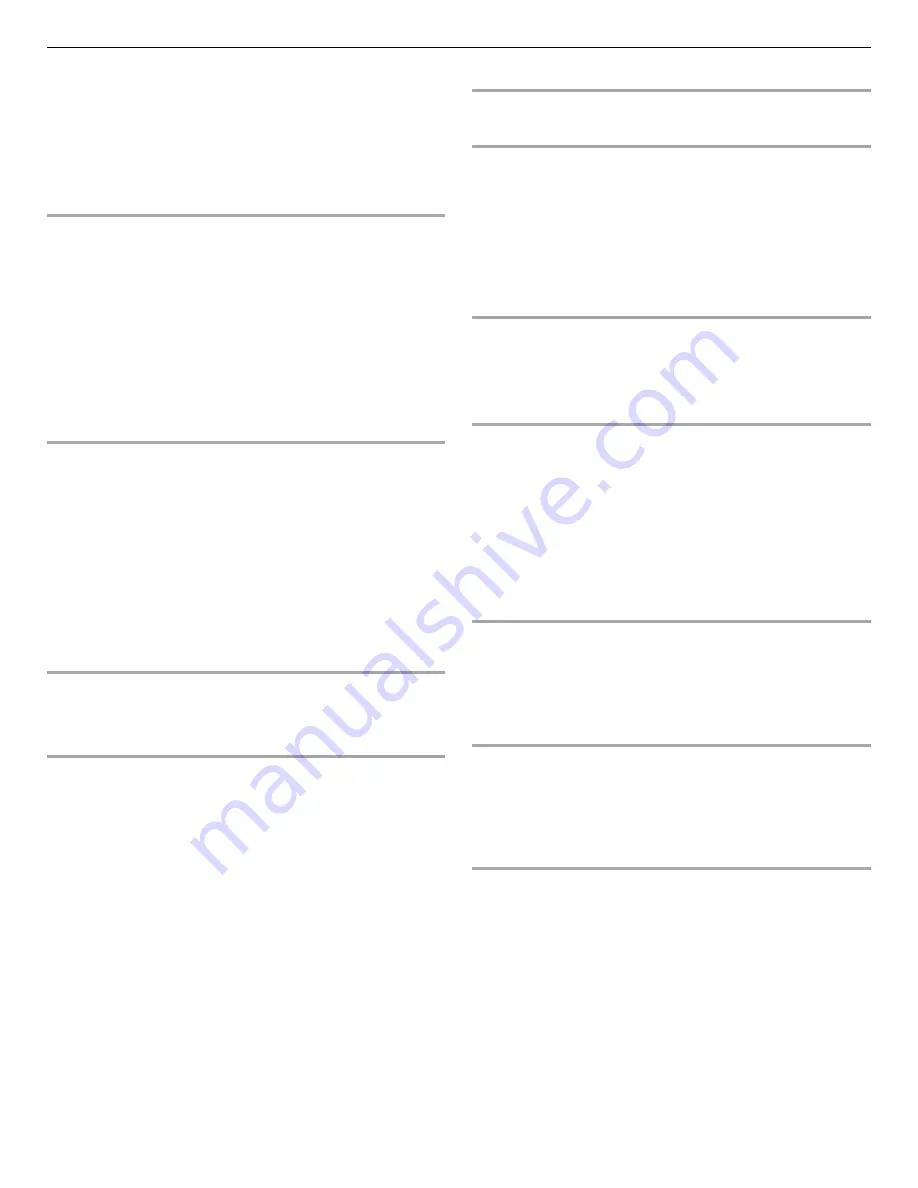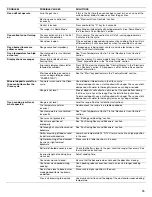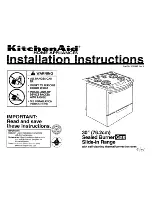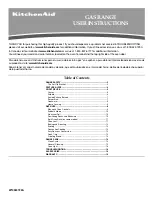
17
General Cleaning
IMPORTANT:
Before cleaning, make sure all controls are off and
the oven and cooktop are cool. Always follow label instructions on
cleaning products. For additional information, you can visit the
Frequently Asked Questions section of our website at
www.kitchenaid.com.
In Canada, reference the Customer Service
section at
www.kitchenaid.ca
.
Soap, water and a soft cloth or sponge are suggested first unless
otherwise noted.
EXTERIOR PORCELAIN ENAMEL SURFACES
(on some
models)
Food spills containing acids, such as vinegar and tomato, should
be cleaned as soon as the entire range is cool. These spills may
affect the finish.
Cleaning Method:
■
Glass cleaner, mild liquid cleaner or nonabrasive scrubbing
pad:
Gently clean around the model and serial number plate
because scrubbing may remove numbers.
■
affresh
®
Kitchen and Appliance Cleaner Part Number
W10355010 (not included):
See “Accessories” section for more information.
STAINLESS STEEL
(on some models)
NOTE:
To avoid damage to stainless steel surfaces, do not use
soap-filled scouring pads, abrasive cleaners, Cooktop Cleaner,
steel-wool pads, gritty washcloths or abrasive paper towels.
Damage may occur to stainless steel surfaces, even with one-time
or limited use.
Cleaning Method:
Rub in direction of grain to avoid damaging.
■
affresh
®
Stainless Steel Cleaner Part Number W10355016 (not
included):
See “Accessories” section for more information.
Liquid detergent or all-purpose cleaner:
Rinse with clean water and dry with soft, lint-free cloth.
METALLIC PAINT
(on some models)
Do not use abrasive cleaners, cleaners with bleach, rust removers,
ammonia or sodium hydroxide (lye) because paint surface may
stain.
PORCELAIN-COATED GRATES AND CAPS
Food spills containing acids, such as vinegar and tomato, should
be cleaned as soon as the cooktop, grates and caps are cool.
These spills may affect the finish.
To avoid chipping, do not bang grates and caps against each other
or hard surfaces such as cast iron cookware.
Do not reassemble caps on burners while wet.
Cleaning Method:
■
Nonabrasive plastic scrubbing pad and mildly abrasive
cleanser:
Clean as soon as cooktop, grates and caps are cool.
■
Dishwasher (grates only, not caps):
Use the most aggressive cycle. Cooked-on soils should be
soaked or scrubbed before going into a dishwasher.
■
Gas Grate and Drip Pan Cleaner Part Number 31617A:
See “Accessories” section for more information.
SURFACE BURNERS
■
See “Sealed Surface Burners” section.
COOKTOP CONTROLS
To avoid damage to the cooktop controls, do not use steel wool,
abrasive cleansers or oven cleaner.
To avoid damage, do not soak knobs. When replacing knobs, make
sure knobs are in the OFF position.
On some models, do not remove seals under knobs.
Cleaning Method:
■
Soap and water:
Pull knobs straight away from control panel to remove.
GRIDDLE
To avoid damaging the nonstick surface, do not clean the griddle in
the dishwasher, or use steel wool and abrasive cleaners.
Cleaning method:
■
Mild detergent
CONTROL PANEL AND OVEN DOOR EXTERIOR
To avoid damage to the control panel, do not use abrasive
cleaners, steel-wool pads, gritty washcloths or abrasive paper
towels.
Cleaning Method:
■
Glass cleaner and soft cloth or sponge:
Apply glass cleaner to soft cloth or sponge, not directly on
panel.
■
affresh
®
Kitchen and Appliance Cleaner Part Number
W10355010 (not included):
See “Accessories” section for more information.
OVEN RACKS
Cleaning Method:
■
Steel-wool pad
■
For racks that have discolored and are harder to slide, a light
coating of vegetable oil applied to the rack guides will help
them slide.
STORAGE DRAWER OR WARMING DRAWER
(on some
models)
Check that storage or warming drawer is cool and empty before
cleaning.
Cleaning Method:
■
Mild detergent
OVEN CAVITY
Use AquaLift™ Technology regularly to clean oven spills.
Do not use oven cleaners.
Food spills should be cleaned when oven cools. At high
temperatures, foods react with porcelain and staining, etching,
pitting or faint white spots can result.
Cleaning Method:
■
Clean cycle: See “Clean Cycle” section.
















































